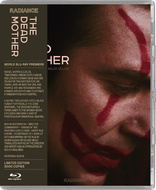The Dead Mother Blu-ray Movie
HomeThe Dead Mother Blu-ray Movie 
La madre muerta | Limited Edition / Blu-ray + CDRadiance Films | 1993 | 111 min | Not rated | Oct 10, 2023
Price
List price:Amazon: $19.47 (Save 51%)
Third party: $19.47 (Save 51%)
Only 7 left in stock (more on the way).
Movie rating
7.3 | / 10 |
Blu-ray rating
| Users | 0.0 | |
| Reviewer | 3.5 | |
| Overall | 3.5 |
Overview
The Dead Mother (1993)
A criminal, shoots and kills a painting restorer during a bungled burglary, and shoots her daughter as well. Twenty years later, the daughter has been left mute and with a mental age of a child, spending most of her time in a mental home.
Starring: Karra Elejalde, Lio, Ramón Barea, Ana Álvarez, Elena IruretaDirector: Juanma Bajo Ulloa
| Foreign | Uncertain |
| Drama | Uncertain |
| Thriller | Uncertain |
Specifications
Video
Video codec: MPEG-4 AVC
Video resolution: 1080p
Aspect ratio: 2.35:1
Original aspect ratio: 2.35:1
Audio
Spanish: LPCM 2.0
Subtitles
English
Discs
Blu-ray Disc
Two-disc set (1 BD, 1 CD)
Playback
Region A (B, C untested)
Review
Rating summary
| Movie | 3.5 | |
| Video | 4.5 | |
| Audio | 4.0 | |
| Extras | 4.0 | |
| Overall | 3.5 |
The Dead Mother Blu-ray Movie Review
Reviewed by Jeffrey Kauffman October 3, 2023They may seem positively quaint in a way to modern sensibilities, but when John Fowles' original source novel from 1963 and then the 1965 film version of The Collector came on the scene, they were both rather controversial in their depiction of a weird loner who kidnaps a woman and then keeps her a literal prisoner in the baroque mansion he has in rural England. The Collector may or may not have inspired some of the plot mechanics of The Dead Mother, but one way or the other, it's probably seriously doubtful if someone fifty or sixty years down the line ever considers this film to be quaint in any way. One of the things Fowles' original story did was to divide his tale into two sections, one from the perspective of the captor and one from the point of view of the captive, and that gave his piece an inherent dialectic that was both fascinating and often quite unsettling. The film version couldn't really indulge in that kind of artifice, but it still managed to create a rather odd and frankly disturbing reaction in the viewer where it was obvious the imperiled female was a sympathetic character, but where the villainous male was also bizarrely "relatable". Co-writer and director Juan Manuel Bajo Ulloa attempts to do something quite similar in The Dead Mother, but he is perhaps hampered by a plot that starts with a thief named Ismael (Karra Elejalde) breaking into the flat of an art restorer, quickly shooting her dead as she comes out in the dark of night to see what the noise is all about, and then even more horrifyingly, shooting the restorer's little daughter, who has also been awakened by the fracas. If this second shooting is not overtly depicted, its effects certainly are, when the story segues forward a couple of decades to find the little girl now a mentally impaired adult named Leire (Ana Álvarez), who has been institutionalized since she's mute and has the mental capacity of a toddler.
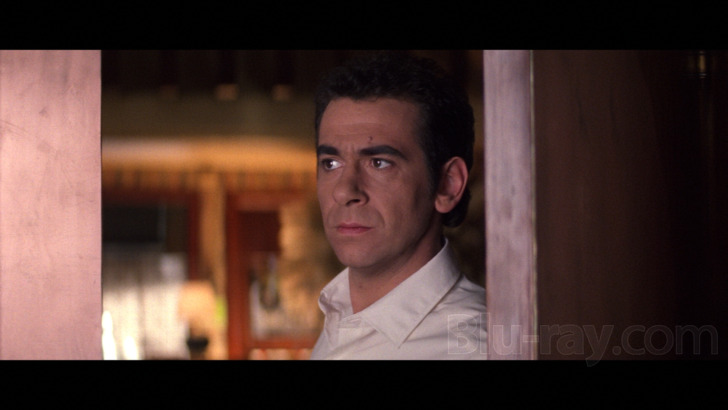
When Ismael catches sight of Leire, he perhaps surprisingly thinks she's somehow going to be able to identify him despite being so obviously incapacitated and so much time having passed (which kind of begs the question of how he recognizes her), and so against the probably wobbly objections of his girlfriend Maite (Lio), he kidnaps the girl and keeps her literally chained to a bed like an animal. It's in this context that Ulloa wants to try to get to that same admittedly troubling ambivalence that Fowles and film director William Wyler wanted to achieve with regard to their kidnapper in The Collector. But it's one thing to have a hapless loner abduct and keep a "normal" woman in relatively decent conditions, and another to have an outright criminal first kill and maim two people and then abduct the survivor, who is clearly disabled. Is it ever going to be possible for an everyday audience member to feel sympathy for such a character? The fact that Ulloa comes unexpectedly close to achieving his goal in the film's final moments is something of a minor miracle, all things considered, and yet my general reaction to the story is that it simply is too unnerving at a gut level to ever generate the kind of "positive" emotion that sympathy and/or empathy are typically thought of as providing.
Both The Collector and The Dead Mother focus on elements of obsession and how that "singular sensation" can be both a curse and perhaps even a path toward salvation, but, again, with a heroine (if that's even the right way to think about Leire) who has already been traumatized and is now developmentally disabled and mute, that entire plot element attains a frankly almost smarmy undertone that I at least don't feel is part of the Fowles story in either its novel or cinematic forms. If this story lacks the literary elements Fowles' version at least included (lots of references to The Tempest, including but not limited to a heroine named Miranda), Ulloa has some rather odd, almost Coen-esque moments to offer in their stead, including a patently daffy scene where Ismael is about to wreak havoc on an elderly woman until he gets a whiff of his own chloroform (interestingly, the "weapon" of choice in The Collector, as well).
The whole aspect of having a supposedly developmentally disabled woman as a kidnap victim (especially under the fraught circumstances the film has already depicted) may seem inherently exploitative, and that same issue may pervade Bajo Ulloa's use of what look like actual patients of an institution in some scenes, in a gambit that reminded me of certain elements in Dementer, a film where filmmaker Chad Crawford Kinkle used his own developmentally disabled sister and several of her cohort at a vocational school as "actors" (quotes since many of them were simply background extras) in his story.
The Dead Mother Blu-ray Movie, Video Quality 
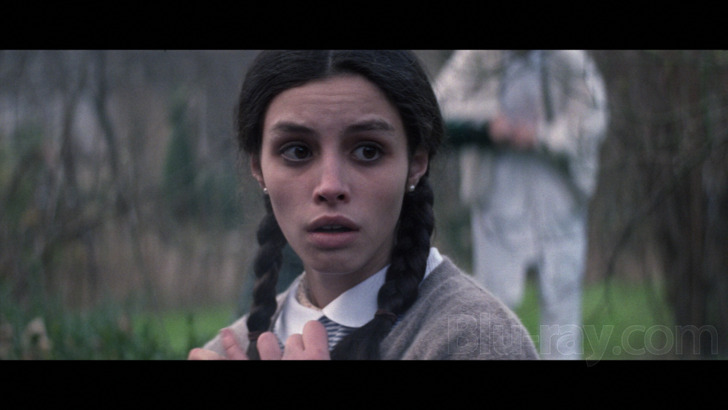
The Dead Mother is presented on Blu-ray courtesy of Radiance Films with an AVC encoded 1080p transfer in 2.35:1. Radiance's insert booklet provides the following information on the transfer:
The Dead Mother was restored from a 4K scan of the 35mm negative. This work was carried out at Cherry Towers lab in Madrid, Spain. The colour grading was carried out on Davinci Resolve on a frame by frame basis. The restoration was carried out on Digital Vision Phoenix via automatic and manual processes to elminate all negative defects. All these works were supervised by Juanma Bajo Ulloa, and keeping in mind the previous colour process made for the DVD in 2008, by the director and Javier Aguirresarobe.This is a first rate looking transfer of a film that has a number of visually unsettling moments, beginning but certainly not limited to the shocking murder that opens the film. A lot of the story is bathed in shadow in what had this been shot in black and white might be thought of as a traditional chiaroscuro approach typifying noir entries. But even with some really gorgeously suffused hues throughout the film, there's still that kind of "dark" approach to the imagery not necessarily limited to lighting conditions. The color timing is rather interesting and I'd say perhaps favors red and purples just a bit at times, leading to some slightly flushed looking flesh tones on occasion (pay attention to some of the institution scenes for some examples). Detail levels are typically excellent, and grain, while somewhat variable, resolves without any real issues.
The Dead Mother Blu-ray Movie, Audio Quality 
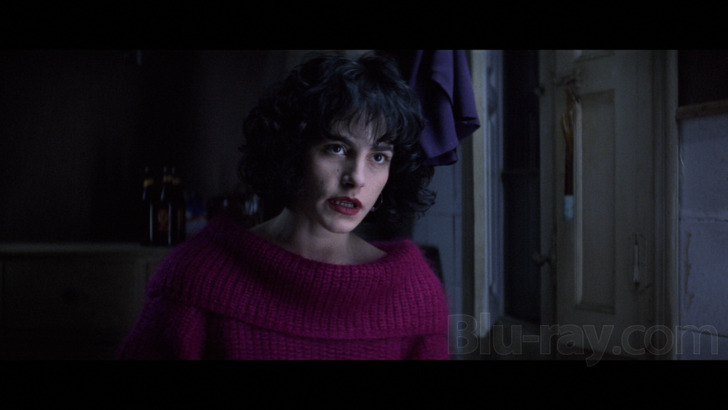
The Dead Mother features a nicely expressive LPCM 2.0 track in the original Spanish, with Bingen Mendizábal's string and oboe drenched score receiving a really nice rendering (aside and apart from the included soundtrack CD). The film offers problem free support for what is alternately talk heavy and then relatively wordless. Ambient environmental effects are also realistic if not especially widely imaged. Dialogue is rendered cleanly and clearly throughout. Optional English subtitles are available.
The Dead Mother Blu-ray Movie, Special Features and Extras 
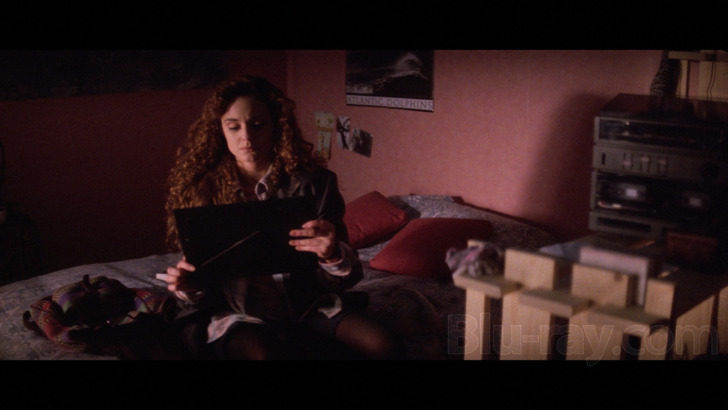
- Audio Commentary by Juan Manuel Bajo Ulloa is in Spanish with English subtitles.
- The Story of The Dead Mother (HD; 38:19) is an archival making of piece from 2008 with quite a bit of behind the scenes footage and some interviews. This is ostensibly in high definition, but looks like it was sourced from an older videotape. Subtitled in English.
- Victor's Kingdom (HD; 38:05) is a disturbing 1989 short by Juanma Bajo Ulloa which won a Goya Award and which traffics in some of the same "intruder in the house" plot mechanics as the main feature. Subtitled in English.
- Trailer (HD; 3:22)
- Gallery (HD)
- Soundtrack CD offers Bingen Mendizábal's really evocative score. This does feature occasional sound effects and even a snippet or two of dialogue, which may slightly interrupt the listening experience.
The Dead Mother Blu-ray Movie, Overall Score and Recommendation 
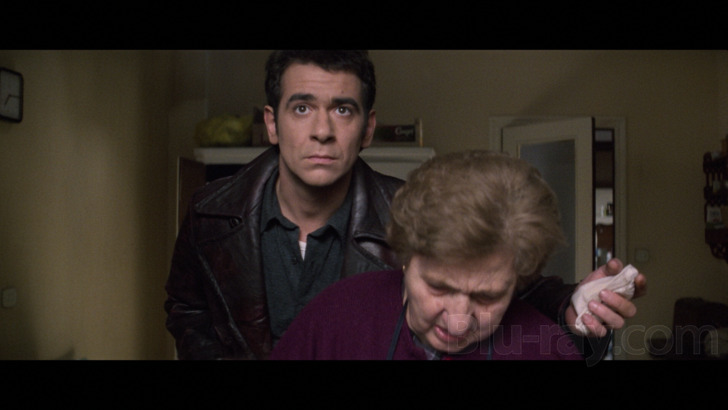
The Dead Mother is often very stylish, but it perhaps can't quite escape (no imprisoned female pun intended) from some of the more troubling aspects of its plot, notably that very imprisoned female, who in this instance is developmentally disabled. This is still a thought provoking story that Radiance offers with secure technical merits and appealing supplements. With caveats noted, Recommended.
Similar titles
Similar titles you might also like

The Sting of Death
死の棘 / Shi no toge
1990

Slap the Monster on Page One
Sbatti il mostro in prima pagina | Limited Edition
1972

Trenque Lauquen
2022

Hunt
헌트 / Heon-teu
2022

Monos
2019

Lux Ćterna
Slipcover in Original Pressing
2019

Monster
怪物
2023

Vital
2004

Diva
1981

The Dogs
1979

A Hijacking
Kapringen
2012

Misunderstood
Incompreso
1966

Woman in the Dunes
砂の女 / Suna no onna
1964

Emanuelle, Queen of the Desert
The Dirty Seven / La belva dalla calda pelle
1982

Freeze Me
フリーズ・ミー / Slipcover in Original Pressing
2000

Nocturama
2016

Adoration
Standard Edition
2019

Bandits of Orgosolo
Banditi a Orgosolo | Limited Edition
1961

Europa
Zentropa
1991

Killer's Mission
賞金稼ぎ / Shōkin kasegi
1969
